

For 25 years, Housing Collaborative has helped locate housing for households experiencing or at risk of homelessness, and those who have lost housing due to disaster, displacement, or eviction.
We are committed to second chances. Many of our dedicated team members have experienced barriers to housing and employment like justice system involvement, homelessness, or domestic violence. They understand firsthand the barriers that our clients face when trying to secure housing, and are well-positioned to help them overcome those barriers.
Housing Collaborative streamlines housing placement by fostering relationships with housing providers willing to offer rental housing to people who are experiencing homelessness or housing insecurity. Housing Collaborative identifies property providers willing to offer them a place to live, assists in removing the financial barriers to housing placement, facilitates lease-up, and supports housing retention throughout tenancy.

A world where everyone can see a path home.

To make affordable housing easier to navigate.

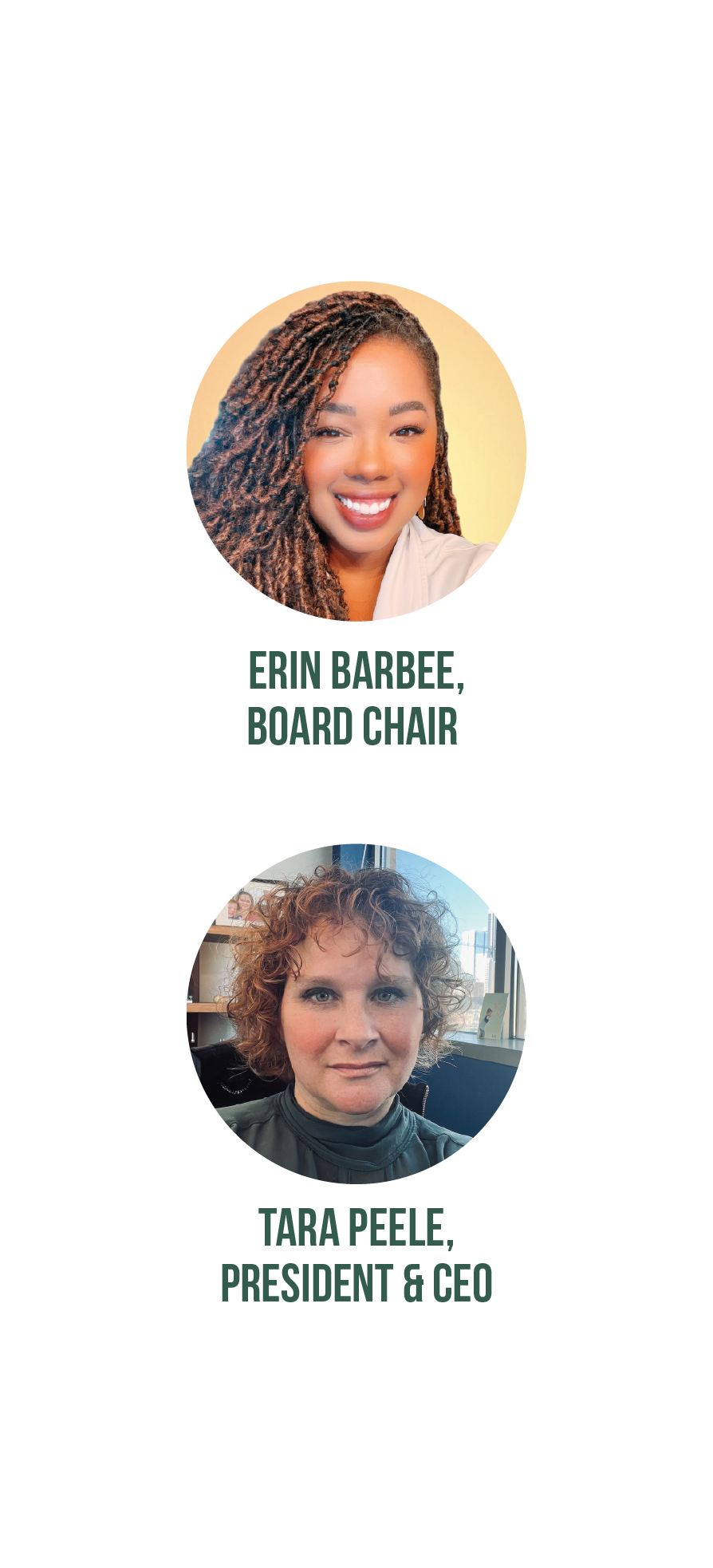
In 2024, Housing Collaborative marked our 25th Anniversary. Though a lot has changed in a quarter-century, the most rapid change for our organization occurred in the last four years.
In early 2020, Housing Collaborative released its first-ever strategic plan, focused on improving our customer service and increasing recognition of our name, which was then Socialserve.
When the Covid-19 pandemic impacted our community, we put that plan aside and got to work.
While we adapted in many ways…
Housing Collaborative (then Socialserve) stepped up in a big way in March 2020, partnering with DreamKey Partners to co-administer rent and utility assistance for households impacted by Covid-19. Over the next 4 years, we distributed over $120 million in payments to help people retain housing in Mecklenburg County. In July 2022, we rebranded as Housing Collaborative, re-orienting our entire staff from national, phone-based housing search and online listing support to local, hands-on housing recruitment, placement, and retention.
Our commitment to second chances remains…
Housing Collaborative works hard to develop and improve a model that not only supports clients, housing providers, and partner agencies, but also creates pathways for people with lived experience. Many of our dedicated team members have experienced barriers to housing and employment, and they use their journeys to help others.
As we begin our next 25 years of service, we will continue to help people find their way home with a focus on scaling up for even greater impact. We’re excited to share this Strategic Framework for 2024 through 2027 with you, and we’re so grateful for your continued support.
Housing instability and homelessness are on the rise, coinciding with an increase in eviction filings and a loss of affordable housing units. Combined, these factors lengthen the time people may be unhoused, which places undue stress on both those experiencing homelessness and those seeking to help them overcome it.
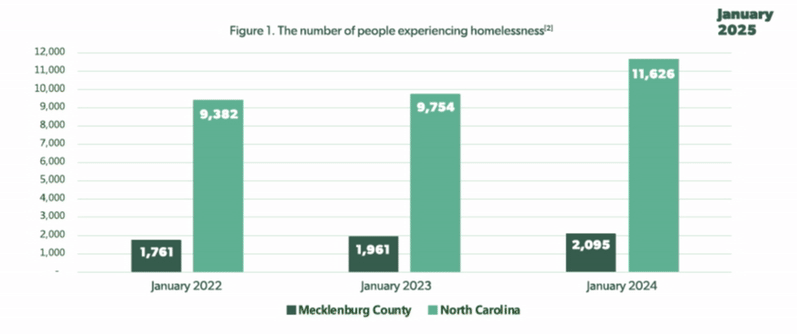
Homelessness has been on the rise in both Mecklenburg County and throughout the State of North Carolina since 2022 (see Figure 1), with the end of pandemic-era eviction moratoria and pandemic resources exacerbating the crisis. In Mecklenburg County, 2,984 people were identified as experiencing homelessness as of January 2025.[1]. This points to a continued increase in homelessness in 2025.
Figure 1. The number of people experiencing homelessness[2]
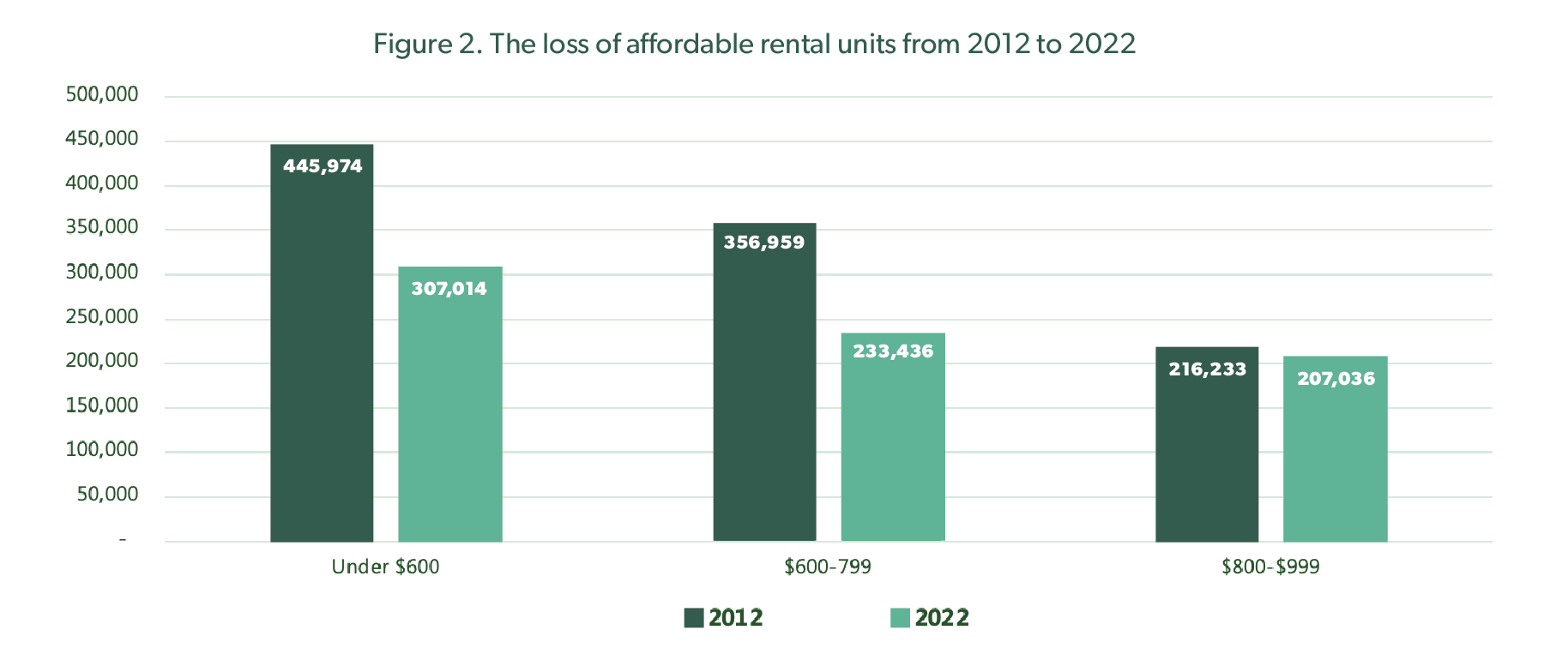
The increase in homelessness can be, at least partially, attributed to the declining stock of affordable housing. The 2024 Charlotte-Mecklenburg State of Housing Instability and Homelessness report notes a 27,693 gap in units affordable to households earning at or below 30% of the Area Median Income, up from 23,060 in 2020. This trend follows that of the State of North Carolina. The National Low Income Housing Coalition’s Out of Reach Report identifies a shortage of 195,821 units that would be affordable to extremely low-income households. Further, Harvard Joint Center for Housing Studies reports[3] a loss of 271,680 units with rents less than $1,000 from 2012 to 2022 (Figure 2).
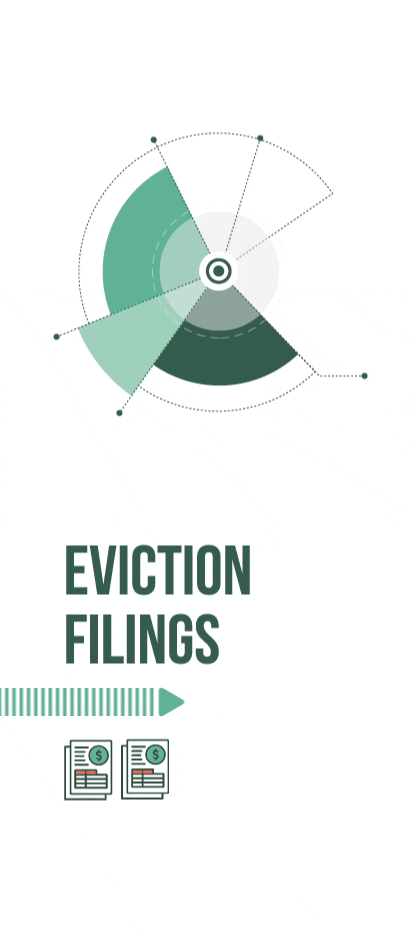
In 2024, 48% of renters in both Mecklenburg County and throughout North Carolina were cost-burdened[4], defined as spending over 30% of income on rent. For households that are cost-burdened, one unexpected event – such as car repair, a health issue or a shift in employment hours – can mean they are no longer able to pay their rent.
As households struggle to pay rent, they are at an increased risk of losing their home. Between 2022 and 2024, eviction filings nearly doubled in Mecklenburg County and increased by almost 25% statewide[5]. Although not all eviction filings are granted, an eviction notice appearing on the tenant’s history creates a long-lasting barrier to obtaining future housing.
The impacts of housing instability are hard to fully measure – they include job loss, increased debt and credit damage, missed days of school, deterioration of health, and more. What is increasingly acknowledged, from local to national levels, is that safe, affordable housing is not only a solution to housing instability and homelessness, but also to better health, educational, and economic outcomes.
Contributors: Dr. Jenny Hutchinson, Sydney Idzikowski, Asha Ellison, UNC Charlotte Urban Institute
Housing Collaborative’s core services increase access to affordable housing by recruiting housing providers, facilitating timely payments and housing inspections, and assisting households through lease-up and beyond.
Homelessness and housing instability is a complex issue that requires diverse solutions. Housing Collaborative works in partnership with like-minded organizations to help those experiencing or at-risk of homelessness to overcome barriers to housing placement.

Housing Collaborative’s housing placement services cultivate lasting relationships with housing providers willing to offer rental units to households who are experiencing homelessness or housing insecurity. The program offers one point-of-contact from application through inspection, move-in, and the duration of tenancy. The services providers that refer households to the program continue to provide stabilizing supportive services, while Housing Collaborative’s staff determines the referred households’ housing needs and identifies available properties.

Housing Collaborative recruits and manages relationships with housing providers willing to offer rental units to households who are experiencing housing insecurity. We streamline the process of housing placement to make it easier for housing providers to work with subsidy-connected households, and to help housing providers navigate any issues. We assist with application and lease-up and throughout tenancy, including helping with lease renewals and checking in monthly with the housing provider.

To expedite housing placement, Housing Collaborative offers housing inspection coordination and property due diligence services throughout North Carolina. Our services include scheduling inspections, reviewing inspection reports for accuracy and completion, confirming asking rents are reasonable compared to similar units, and verifying ownership.
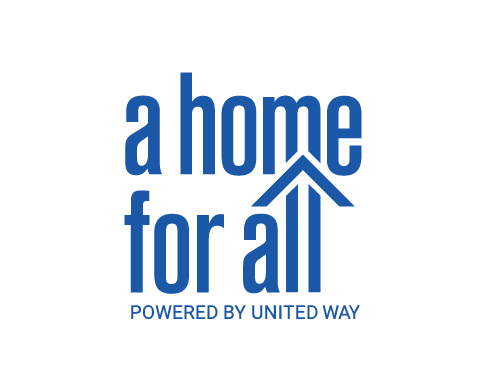
A Home for All
A Home For All is a community-wide effort to address homelessness and housing instability in Charlotte-Mecklenburg. The initiative focuses on ensuring homelessness is rare, brief, and non-recurring. Housing Collaborative was selected to engage, incentivize, and support housing provider partners. Our goal in Y1 is to secure 400 new affordable housing units.
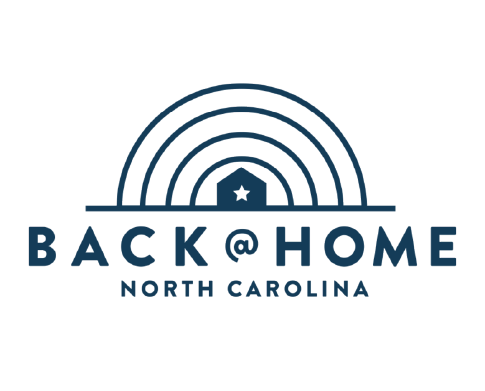
Naturally Occurring Affordable Housing (NOAH) Program
The NOAH Rental Subsidy Program provides opportunities for households with extremely low incomes to live in high-quality rental housing preserved through local Housing Impact Fund investments. Housing Collaborative places households in a subset of NOAH units and administers rental assistance that bridges the gap between what the residents can afford and the asking rents.
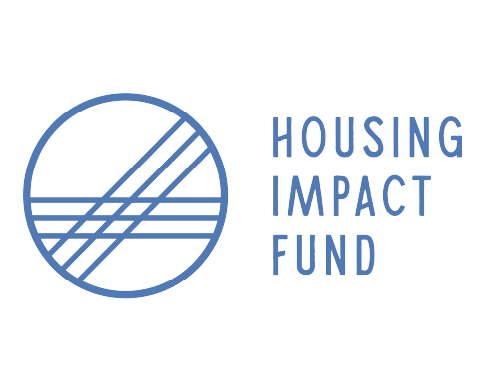
Back@Home
Back@Home is a collaborative rehousing framework initially launched as a disaster response. Currently, Back@Home is addressing homelessness throughout rural North Carolina through rapid rehousing, housing stability services, and financial assistance. Housing Collaborative provides centralized housing recruitment, navigation, inspection, and payment services for Back@Home. Since February 2024, we have placed 500 households through the Back@Home partnership.
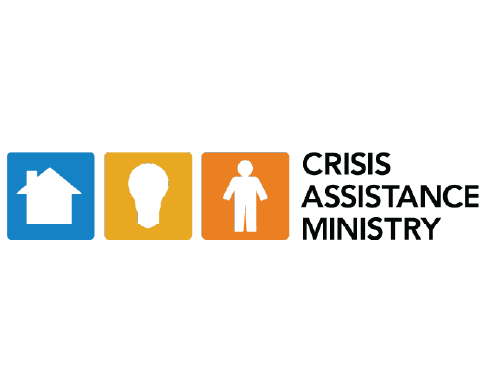
Displacement and Relocation Program
Crisis Assistance Ministry partners with Housing Collaborative to rehouse households displaced due to mass displacement events caused by property closures and natural disasters.
Building upon the partnerships and activities described above, Housing Collaborative will secure housing for at least 2,000 households in the next three years by focusing on four strategic directions.

Strategic Direction 1: Scale Up for Impact
Goal: Scale up housing programs through use of housing provider incentives, compelling marketing, implementation of best practices, and effective use of data.
Actions:
1. Implement across-the-board housing provider incentives.
2. Use market research to develop effective housing provider recruitment efforts.
3. Deploy communications that will benefit and engage housing providers and funders.
4. Research and replicate successful housing recruitment and retention strategies.
5. Establish a fundraising and data innovation team to tell the story of our work.

Strategic Direction 2: Build Internal Capacity
Goal: Build capacity for increased impact by investing in team member development, performance management, balanced workloads, clear workflows, data systems, and program evaluation.
Actions:
1. Implement a robust internal performance management, incentive, and training program.
2. Add leadership positions that increase impact.
3. Invest in improvements in data system of record.
4. Develop a mature and effective compliance department.
5. Create detailed and accessible agency operations guides.

Strategic Direction 3: Diversify Funding
Goal: Create and implement a development plan, explore and expand non-governmental sources of revenue, and deepen relationships with current and potential funders.
Actions:
1. Create 1-, 2-, and 3-year development plans.
2. Seek diverse sources of income to reduce reliance on government funding.
3. Explore formal partnerships or mergers with like-minded organizations.
4. Deepen relationships with current funders.
5. Cultivate relationships with potential new funders.

Strategic Direction 4: Provide Exceptional Service
Goal: Continuously assess and improve the service experience of our customers and partner agencies.
Actions:
1. Continue customer and property visits and implement annual surveys.
2. Launch housing provider portal where housing partners can check payment status, share concerns, and report property availability.
3. Add housing provider, partner agency, and consumer advocate representation to Board of Directors.
4. Conduct a full evaluation of housing placement and recruitment programs including input from customers, partner agencies, and property providers.
Board Members
Erin Barbee, Chair Chief Strategy Officer, DreamKey Partners
Bill Bolstad, Treasurer Executive Director, Mosaic Development Group
Ivan Diaz-Campos, Vice Chair Independent Strategic Advisor
Alassane Diouf, Risk Advisory, Wells Fargo
Miriam Espaillat, Director – Community Engagement and Development, Raydal Hospitality, LLC
Mark Ethridge, Secretary Principal, Ascent Housing
Nicola Grant, Director of Operations, Red Hill Ventures
Lonnie Harris, Director of Finance & Administration, Greater Charlotte Apartment Association
LaShonda Hart, Program Manager, Affordable Housing Initiatives, Mecklenburg County
Courtney Lundquist, Regional VP, S.L. Nusbaum Realty Co.
Beverly McCluney, Director of Operations, LSA Management
Tashika McKnight, Consumer Advocate
Christina Metheney, Director of Property & Asset Management, Wesley Community Development Corporation
Megan Sadler, Attorney, Venn Law Group
Team Members
Indira Cosio, Chief Administrative Officer
Nicole Dewitt, Chief Program Officer
Charlene Elliott, Director of State Housing Programs
Jamien Harvey, Director of Community Partnerships
Tara Peele, President & CEO
Leslie Santos, Director of Compliance
[1] Charlotte-Mecklenburg Housing and Homelessness Dashboard at https://mecklenburghousingdata.org.
[2] US Housing & Urban Development Annual Homeless Reports and Mecklenburg County Point-In-Time Counts, 2022-2024.
[3] Harvard Joint Center for Housing Studies tabulations of US Census Bureau, American Community Survey 1-Year Estimates.
[4] NC Housing Coalition at https://nchousing.org/county-fact-sheets/.
[5] Civil Court Data Initiative at https://civilcourtdata.lsc.gov/data/eviction/north-carolina.
Contributors: Dr. Jenny Hutchinson, Sydney Idzikowski, Asha Ellison, UNC Charlotte Urban Institute